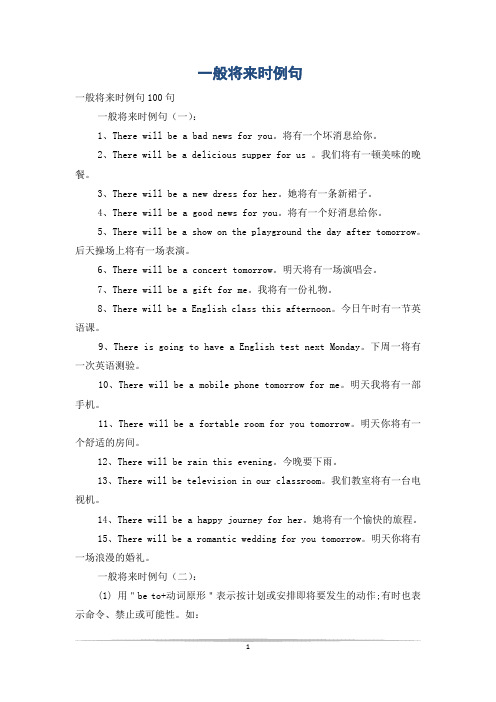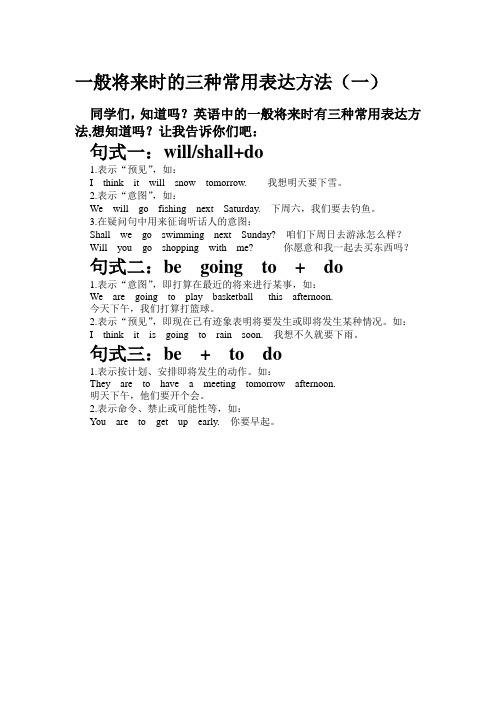一般将来时(一)
一般将来时例句

一般将来时例句一般将来时例句100句一般将来时例句(一):1、There will be a bad news for you。
将有一个坏消息给你。
2、There will be a delicious supper for us 。
我们将有一顿美味的晚餐。
3、There will be a new dress for her。
她将有一条新裙子。
4、There will be a good news for you。
将有一个好消息给你。
5、There will be a show on the playground the day after tomorrow。
后天操场上将有一场表演。
6、There will be a concert tomorrow。
明天将有一场演唱会。
7、There will be a gift for me。
我将有一份礼物。
8、There will be a English class this afternoon。
今日午时有一节英语课。
9、There is going to have a English test next Monday。
下周一将有一次英语测验。
10、There will be a mobile phone tomorrow for me。
明天我将有一部手机。
11、There will be a fortable room for you tomorrow。
明天你将有一个舒适的房间。
12、There will be rain this evening。
今晚要下雨。
13、There will be television in our classroom。
我们教室将有一台电视机。
14、There will be a happy journey for her。
她将有一个愉快的旅程。
15、There will be a romantic wedding for you tomorrow。
【初中英语】 一般将来时专项(1)

必备英语【初中英语】一般将来时专项一、初中英语一般将来时1.—I've never seen Mr. Taylor before.—Don't worry. I ______ him to you before the meeting.A. will introduceB. introducedC. have introducedD. had introduced【答案】 A【解析】【分析】句意:——我以前从没见过泰勒先生。
别担心。
开会前我会把他介绍给你。
根据上句 I've never seen Mr. Taylor before. 到现在为止没有见过他,所以才有开会前介绍给你。
要用一般将来时,will+动词原形。
故选A。
【点评】考查一般将来时的构成和用法。
注意根据语境确定动词的时态。
2.With the development of science and technology, robot cooks ______ in our families in the future.A. appearB. appearedC. will appearD. were appearing【答案】 C【解析】【分析】句意:随着科学技术的发展,在未来机器人厨师将出现在我们的家庭中. 根据in the future可知,此句表示动作发生在将来,所以用一般将来时态;一般将来时态结构为:will+动词原形,故选C.【点评】判断动词的时态,要通过所给的时间状语、提示词或语境去判断动词存在的状态. 一般将来时态结构为:will+动词原形.3.I don't know whether mom _________ me to Beijing next week.A. takeB. takesC. will takeD. would take【答案】 C【解析】【分析】句意:我不知道妈妈下周是否会带我去北京。
一般将来时句型转换

一般将来时句型转换(一):表示计划,打算或将来要发生的事情。
will + do (I, we shall do)表将来要发生的事情。
be (is, am, are) +going to do sth 表计划,打算,准备要做某事。
1.I`ll go and join them.否定句:一般疑问句:特殊疑问句:2.It will be Christmas soon.否定句:一般疑问句:特殊疑问句:反义疑问句:选择疑问句:( the Spring Festival )3.She will have an English lesson the day after tomorrow.否定句:一般疑问句:特殊疑问句:反义疑问句:选择疑问句:( P.E. )4.I am going shopping this afternoon.否定句:一般疑问句:特殊疑问句:反义疑问句:选择疑问句:(fishing )5.He is going to see his grandpa tomorrow.否定句:一般疑问句:特殊疑问句:反义疑问句:选择疑问句:( uncle )6.My brother is going to Shanghai next month.否定句:一般疑问句:特殊疑问句:反义疑问句:选择疑问句:( Beijing)7.They are going to meet at 6 o`clock.否定句:一般疑问句:特殊疑问句:反义疑问句:选择疑问句:( 7 o`clock )8.We are going to see a film tomorrow evening.否定句:一般疑问句:特殊疑问句:选择疑问句:( watch TV )9.There will be a sports meeting in our school next week.否定句:一般疑问句:特殊疑问句:反义疑问句:选择疑问句:( next month )10.There is going to be a new hospital next year.否定句:一般疑问句:特殊疑问句:反义疑问句:选择疑问句:( next century )1/1。
一般将来时的三种常用表达方法(一)

一般将来时的三种常用表达方法(一)
同学们,知道吗?英语中的一般将来时有三种常用表达方法,想知道吗?让我告诉你们吧:
句式一:will/shall+do
1.表示“预见”,如:
I think it will snow tomorrow. 我想明天要下雪。
2.表示“意图”,如:
We will go fishing next Saturday. 下周六,我们要去钓鱼。
3.在疑问句中用来征询听话人的意图:
Shall we go swimming next Sunday? 咱们下周日去游泳怎么样?
Will you go shopping with me? 你愿意和我一起去买东西吗?句式二:be going to + do
1.表示“意图”,即打算在最近的将来进行某事,如:
We are going to play basketball this afternoon.
今天下午,我们打算打篮球。
2.表示“预见”,即现在已有迹象表明将要发生或即将发生某种情况。
如:
I think it is going to rain soon. 我想不久就要下雨。
句式三:be + to do
1.表示按计划、安排即将发生的动作。
如:
They are to have a meeting tomorrow afternoon.
明天下午,他们要开个会。
2.表示命令、禁止或可能性等,如:
You are to get up early. 你要早起。
一般将来时态精讲

一般将来时态精讲TPMK standardization office TPMK5AB- TPMK08- TPMK2C- TPMK18一般将来时态精讲(一)一般将来时(de)定义一般将来时表示将来某个时间所发生动(de)作或存在(de)状态,也可表示将来经常或反复发生(de)动作,经常与表示将来(de)时间状语连用, 如:soon, tomorrow,next week, in a few days等.例如:Where will you be this time tomorrow 明天这个时候你会在那儿1. 表示将要发生(de)动作或存在(de)状态.例如:I will return the book in a few days. 我过几天会还这本书.2. 表示将来经常或反复发生(de)动作.例如:They will go to the park every Sunday. 他们将每周日去公园.(二)一般将来时(de)构成一般将来时由“助动词shall/will+动词原形”构成.系动词am, is, are都用动词原形be.1. shall用于第一人称后表示一般将来时,一般只限于肯定句和否定句中.shall通常用于第一人称后,由其构成(de)一般疑问句用来询问对方(de)意见,这时(de)shall不含将来含义,也不可被will替代.例如:There’s no one to answer the phone. What shall we do 没有人接,我们该怎么办2.美国英语中,不论什么人称和数,一律用“will+动词原形”.在口语中,will常缩写为’ll,与主语连写在一起.如:I’ll, you’ll, he’ll, she’ll, we’ll, they’ll;而shall not常缩写为shan’t,will not常缩写为won’t.(三)一般将来时(de)结构1. 肯定句:主语+shall\will+动词原形.I shall\will work next year. 明年我将要工作了.2. 否定句:主语+shall\ will+not+动词原形.I won’t tell anyone what you said. 你说(de)话我不会告诉任何人.3. 一般疑问句:Shall\Will+主语+动词原形—Will you leave for Beijing next week 下周你将前往北京吗—Yes, I will. 是(de),我将要去. No, I won’t. 不,我不去.4. 特殊疑问句“特殊疑问词+一般疑问句”(de)语序,也就是“疑问词+will+主语+动词原形+其他成分”.如果是对主语提问,则主语就不在句子中出现.例如:Who will leave for Beijing next week 下周谁将前往北京(四)There be 句型(de)一般将来时There be 句型(de)一般将来时There will be表示“将来有……”.1. 肯定句:There will be+ 物+ 介词短语+其他.例如:There will be cars in people’s home in the future..将来人们(de)家里会很多(de)小汽车.2. 否定句:There won’t be + 物+介词短语+ 其他.例如:There won’t be any trees in this place in two years.两年后这个地方就不会有树了.3. 疑问句:Will there be +物+介词短语+其他例如:—Will there be less pollution 将来会有更少(de)污染吗—Yes, there will.是(de),会(de).—No, there won’t. 不,不会.(五)be going to 表示将来1.用来表示按计划或安排要发生(de)动作We are going to have a class meeting this afternoon.今天下午我们打算开班会.2.表示推测将要或肯定会发生(de)动作,有“准备;打算”(de)意思.含有be going to 结构(de)句子中往往有表示将来(de)时间状语.例如:Look at the black clouds. It's going to rain.看那些乌云,快要下雨了.结构:肯定句:主语 + be(am,is,are) + going to do sth.否定句:主语 + be(am,is,are)+ not + going to do sth.疑问句:Be(am,is,are)+ 主语 + going to do sthYes, 主语+ am/is/are. / No, 主语+ isn't/aren't. / No, I'm not. They are going to see the car factory next week. (肯定句) They are not going to see the car factory next week. (否定句)-Are they going to see the car factory next week-Yes, they are. (No, they aren't.) (一般疑问句及其回答)注意:There is / are going to be... (注意句型中going to 后面(de)be不能改为have.) 常用来表示将有某事发生.例如:There is going to be a football match next Saturday in our school.下周六我们学校将有一场足球比赛.(六)come, go, leave, arrive,take等表示位置移动(de)动词常用现在进行时表示将要发生(de)动作,它们很少与be going to 结构连用.例如:Miss Sun is coming tonight.今晚孙小姐要来.(七)be going to 和will(de)区别1.will表示说话人认为、相信、希望或假定要发生(de)事,不含任何具体(de)时间,可以指遥远(de)将来;而be going to 指有迹象表明某事即将发生或肯定发生,通常指很快就要发生(de)事情.2. be gong to 和will均可表示意图,但事先考虑过(de)意图用be going to,不是事先考虑过(de)意图用will.一般将来时练习一、单项选择( ) 1. There __________ a meeting tomorrow afternoon.A. will be going toB. will going to beC. is going to beD. will go to be( ) 2. Charlie ________ here next month.A. isn’t workingB. doesn’t workingC. isn’t going toworking D. won’t work( ) 3. He ________ very busy this week, he ________ free next week.A. will be; isB. is; isC. will be; will beD. is;will be( ) 4. There ________ a dolphin show in the zoo tomorrow evening.A. wasB. is going to haveC. will haveD.is going to be( ) 5. –________ you ________ free tomorrow – No. I ________ free the day aftertomorrow.A. Are; going to; willB. Are; going to be; willC. Are; going to; will beD. Are; going to be; will be( ) 6. Mother ________ me a nice present on my next birthday.A. will givesB. will giveC. givesD.give( ) 7. – Shall I buy a cup of tea for you –________. (不,不要.)A. No, you won’t.B. No, you aren’t.C. No, please don’t.D. No, please.( ) 8. – Where is the morning paper – I ________ it for youat once.A. getB. am gettingC. to getD. will get ( ) 9. ________ a concert next SaturdayA. There will beB. Will there beC. There can beD. There are( ) 10. If they come, we ________ a meeting.A. haveB. will haveC. hadD. would have( ) 11. He ________ her a beautiful hat on her next birthday.A. givesB. gaveC. will givingD. isgoing to give( ) 12. He ________ to us as soon as he gets there.A. writesB. has writtenC. will writeD. wrote( ) 13. He ________ in three days.A. coming backB. came backC. will come backD. isgoing to coming back( ) 14. If it ________ tomorrow, we’ll go roller-skating.A. isn’t rainB. won’t rainC. doesn’t rainD. doesn’t fine( ) 15. – Will his parents go to see the Terra Cotta Warriorstomorrow– No, ________ (不去).A. they willn’t.B. they won’t.C. they aren’t.D. they don’t.( ) 16. Who ________ we ________ swimming with tomorrow afternoonA. will; goB. do; goC. will; goingD. shall;go( ) 17. We ________ the work this way next time.A. doB. will doC. going to doD. will doing( ) 18. Tomorrow he ________ a kite in the open air first, and then________ boating in thepark.A. will fly; will goB. will fly; goesC. is going to fly;will goes D. flies; will go( ) 19. The day after tomorrow they ________ a volleyball match.A. will watchingB. watchesC. is watchingD. is going to watch( ) 20. There ________ a birthday party this Sunday.A. shall beB. will beC. shall going to beD. will going to be( ) 21. They ________ an English evening next Sunday.A. are havingB. are going to haveC. will havingD. is going to have( ) 22. ________ you ________ free next SundayA. Will; areB. Will; beC. Do; beD. Are; be( ) 23. He ________ there at ten tomorrow morning.A. willB. isC. will beD. be( ) 24. ________ your brother ________ a magazine from the libraryA. Are; going to borrowB. Is; going to borrowC. Will; borrowsD. Are; going to borrows( ) 25. – Shall I come again tomorrow afternoon –________ (好(de)).A. Yes, pleaseB. Yes, you will.C. No, please.D. No, you won’t.( ) 26. It ________ the year of the horse next year.A. is going to beB. is going toC. will beD. will is( ) 27. ________ open the windowA. Will you pleaseB. Please will youC. You pleaseD. Do you( ) 28. –Let’s go out to play football, shall we – OK. I________.A. will comingB. be going to comeC. comeD. am coming( ) 29. It ________ us a long time to learn English well.A. takesB. will takeC. spendsD. will spend ( ) 30. The train ____ at 11.A. going to arriveB. will be arriveC. is going toD. is arriving二、动词填空1. I ______(leave)in a minute. I ______(finish)all my work before I ______ (leave).2. —How long _____ you _____(study)in our country—I _____(plan)to be here for about one more year.—I _____(hope)to visit the other parts of your country.—What ______ you ______(do)after you ______(leave)here—I ______(return)home and ______(get)a job.3. I ______(be)tired. I ___________(go)to bed early tonight.4. Mary’s birthday is next Monday, her mother __________(give)her a present.5. It is very cold these days. It ___________(snow)soon.6. —_____ you _____(be)here this Saturday —No. I ___________(visit)my teacher.7. —______ I ______(get)you a copy of today’s newspaper —Thank you.8. I am afraid there ______(be)a meeting this afternoon. I can’t join you.9. Mike ___________( not , believe)this until he ______(see)it with his own eyes.10. Most of us don’t think their team ______(win).三、句型转换.1. People in the north often go skating in winter. (next winter)________________________________________________________________________ ______2.There are two cinemas in that town. (next year)________________________________________________________________________ ______3.He comes back late.(in two days)________________________________________________________________________ ______4.She is a conductor of a train.(soon)________________________________________________________________________ ______5.Li Ming is ten years old.(next year)________________________________________________________________________ ______6.I sometimes write to my mother in the evening.(tonight)________________________________________________________________________ ______7.He went there by plane.(some day next year)________________________________________________________________________ ______8.China is a modern and strong country.(in twenty years)________________________________________________________________________ ______9.Do you study hard(from now on)________________________________________________________________________ ______10.She didn’t speak English at the meeting.(before long)________________________________________________________________________ ______。
【英语】复习专题——一般将来时知识点归纳(1)

【英语】复习专题——一般将来时知识点归纳(1)一、一般将来时1.—What is your plan for next weekend, Lingling?—I volunteer work in the museum.A. was doingB. didC. have doneD. am going to do【答案】 D【解析】【分析】句意:——玲玲,你下周末打算干什么?——我要去博物馆做义工。
根据题干中的next weekend,可知此句要用一般将来时,故选D。
【点评】考查一般将来时的基本构成及用法。
2.With the development of science and technology, robot cooks ______ in our families in the future.A. appearB. appearedC. will appearD. were appearing【答案】 C【解析】【分析】句意:随着科学技术的发展,在未来机器人厨师将出现在我们的家庭中. 根据in the future可知,此句表示动作发生在将来,所以用一般将来时态;一般将来时态结构为:will+动词原形,故选C.【点评】判断动词的时态,要通过所给的时间状语、提示词或语境去判断动词存在的状态. 一般将来时态结构为:will+动词原形.3.Michael _________ in a school in Yunnan from February to June next year.A. teachB. taughtC. will teachD. was teaching【答案】C【解析】【分析】句意:Michael将会在明年2月到6月在云南的学校教学。
A动词原形;B一般过去时;C是一般将来时;D是过去进行时。
Next year是一般将来时的时间状语,will+动词原形,故答案为C。
【点评】考查动词的时态,注意句中的时间状语。
【英语】 一般将来时英语期末复习(1)
【英语】一般将来时英语期末复习(1)一、一般将来时1.In a few years' time, there _______ more trees on this hill.A. areB. is going to haveC. will haveD. will be【答案】 D【解析】【分析】句中有In a few years' time, 说明应用一般将来时。
将有…一定要用there will be或there is going to be. 故选D。
【点评】考查there + be 结构的将来时态,关键在于掌握后面应用be 而不是have.2.— There ________a football match on TV tonight. I can't wait to watch it.— Me, too. It's ________ Guangzhou Evergrande and the Australian team Melbourne Victory.A. will be; betweenB. will be; bothC. will have; betweenD. will have; both【答案】A【解析】【分析】句意为:---今晚将有一场电视直播足球比赛,我非常想看。
---我也是。
这是广州恒达足球俱乐部与澳大利亚墨尔本足球俱乐部之间的比赛。
根据语境,这是there be结构的一般将来时,应用there will be;both指两者,between指两者之间。
故选A。
【点评】考查there be结构以及词语辨析。
3.Mr. Green, a famous writer, ______our school next week.A. visitedB. visitsC. was visitingD. will visit【答案】 D【解析】【分析】句意:格林先生,一位著名的作家,下周要来我们学校参观。
一般将来时考点解析(Word版附答案)(word)(1)
一般将来时考点解析(Word版附答案)(word)(1)一、一般将来时1.We____ shopping unless it ____ tomorrow.A. will go, will rainB. go, will rainC. will go, rainsD. go, rains【答案】C【解析】【分析】句意:除非明天下雨,否则我们将会去购物。
unless 除非,引导条件状语从句,从句中应该用一般现在时表示将来,主句用一般将来时。
故应选C。
【点评】考查动词时态。
2.Michael _________ in a school in Yunnan from February to June next year.A. teachB. taughtC. will teachD. was teaching【答案】C【解析】【分析】句意:Michael将会在明年2月到6月在云南的学校教学。
A动词原形;B一般过去时;C是一般将来时;D是过去进行时。
Next year是一般将来时的时间状语,will+动词原形,故答案为C。
【点评】考查动词的时态,注意句中的时间状语。
3.Look on the bright side of life,and imagine that you ______ a happy and successful future.A. hadB. will haveC. haveD. have had【答案】 B【解析】【分析】考查时态.句意"看看生活中美好的一面,想象你会有一个幸福和成功的未来.".A过去时.B一般将来时态.C动词原形.D现在完成时态.结合语境"看看生活中美好的一面,想象你___一个幸福和成功的未来.",由future未来,可知,表示将来,用一般将来时态.答案是B.4.I don't know if he _____ tomorrow. If he _____, I'll go to see him.A. leaves; gets upB. will go; will goC. will come; comesD. is arriving; leaves 【答案】 C【解析】【分析】我不知道明天他是否会来。
英语一般将来时(一)解题方法和技巧及练习题及解析
英语一般将来时(一)解题方法和技巧及练习题及解析一、初中英语一般将来时1.—Do you know ______?—The day after tomorrow.A. when we visited the museumB. when we will visit the museumC. when did we visit the museumD. when will we visit the museum【答案】 B【解析】【分析】句意:——你知道我们什么时候参过博物馆吗?——后天。
Do you know 后接宾语从句,应使用陈述结构,因此排除C和D,根据答语The day after tomorrow.可知问句使用一般将来时,故答案是B。
【点评】考查宾语从句的语序各时态,注意宾语从句使用陈述语序,根据答语确定问句的时态。
2.— I hear your father has gone to Tokyo on business?— Yes. And he _______ in three weeks.A. has returnedB. will returnC. would returnD. returns【答案】 B【解析】【分析】句意:—我听说你父亲出差去日本了?—是的。
他将在三周后回来。
时间状语in three weeks与一般将来时连用,故选B。
3.—Have you watched the new movie Kung Fu Panda 3, Kelly?—Not yet. I _____ it with my classmate tonight.A. will watchB. was watchingC. have watched【答案】A【解析】【分析】句意:—凯莉,你看过新电影《功夫熊猫3》吗?—还没有呢。
今天晚上我要和我的同学一起去看。
A. will watch一般将来时态形式;B. was watching过去进行时态形式;C. have watched现在完成时态形式。
一般将来时难题及答案(1)
一般将来时难题及答案(1)一、一般将来时1.—Do you know ______?—The day after tomorrow.A. when we visited the museumB. when we will visit the museumC. when did we visit the museumD. when will we visit the museum【答案】 B【解析】【分析】句意:——你知道我们什么时候参过博物馆吗?——后天。
Do you know 后接宾语从句,应使用陈述结构,因此排除C和D,根据答语The day after tomorrow.可知问句使用一般将来时,故答案是B。
【点评】考查宾语从句的语序各时态,注意宾语从句使用陈述语序,根据答语确定问句的时态。
2.With the development of science and technology, robot cooks ______ in our families in the future.A. appearB. appearedC. will appearD. were appearing【答案】 C【解析】【分析】句意:随着科学技术的发展,在未来机器人厨师将出现在我们的家庭中. 根据in the future可知,此句表示动作发生在将来,所以用一般将来时态;一般将来时态结构为:will+动词原形,故选C.【点评】判断动词的时态,要通过所给的时间状语、提示词或语境去判断动词存在的状态. 一般将来时态结构为:will+动词原形.3.— I hear your father has gone to Tokyo on business?— Yes. And he _______ in three weeks.A. has returnedB. will returnC. would returnD. returns【答案】 B【解析】【分析】句意:—我听说你父亲出差去日本了?—是的。
- 1、下载文档前请自行甄别文档内容的完整性,平台不提供额外的编辑、内容补充、找答案等附加服务。
- 2、"仅部分预览"的文档,不可在线预览部分如存在完整性等问题,可反馈申请退款(可完整预览的文档不适用该条件!)。
- 3、如文档侵犯您的权益,请联系客服反馈,我们会尽快为您处理(人工客服工作时间:9:00-18:30)。
一般将来时主要有以下几种表现形式:
(1)一般将来时表示将要发生的动作或情况。
例如:It will rain tomorrow.
(2)be going to+动词原形
a.表示打算、准备做的事。
例如:
We are going to put up a building here.我们打算在这里盖一座楼。
b.表示即将发生或肯定要发生的事。
例如:
I think it is going to snow. 我看要下雪了。
c.“will”句型与“be going to”句型,前者表示纯粹将来,后者表示打算、计划、准备做的事情,更强调主语的主观意愿。
例如:
Tomorrow will be Saturday. 明天是周六了。
We are going to visit Paris this summer.今年夏天我们打算游览巴黎。
一、用所给词的适当形式填空。
1.I ______(be)tired. I ______(go)to bed early tonight.
2.Mary’s birthday is next Monday, her mother _____(give)her a present.
3.It is very cold these days. It ______(snow)soon.
4.—_____ you _____(be)here this Saturday?
—No. I ______(visit)my teacher.
5.Most of us don’t think their team ______(win).
二、单项选择
1.He ________ her a beautiful hat on her next birthday.
A.gives
B.gave
C.will giving
D.is going to give
2.He ________ to us as soon as he gets there.
A.writes
B.has written
C.will write
D.wrote
3.He ________ in three days.
ing back
B.came back
C. will come back
D. is going to coming back
4.–Will his parents go to see the Terra Cotta Warriors tomorrow?
–No, ________ (不去).
A.they willn’t
B.they won’t.
C.they aren’t
D.they don’t.
5.Who ________ we ________ swimming with tomorrow afternoon?
A.will; go
B.do; go
C.will; going
D.shall; go
6.We ________ the work this way next time.
A.do
B.will do
C.going to do
D.will doing
7.The day after tomorrow they ________ a volleyball match.
A.will watching
B.watches
C.is watching
D.are going to watch
8.There ________ a birthday party this Sunday.
A.shall be
B.will be
C.shall going to be
D.will going to be
9.They ________ an English evening next Sunday.
A.are having
B.are going to have
C.will having
D.is going to have
10.________ you ________ free next Sunday?
A.Will; are
B.Will; be
C.Do; be
D.Are; be
11.He ________ there at ten tomorrow morning.
A.will
B.is
C.will be
D.be
三、句型转换
1.His father is going to cook dinner for him.
__________________________________________________(改为否定句)
__________________________________________________(改为一般疑问句,否定答)__________________________________________________(划线部分提问)
2.I’m going to play sports next Saturday.
__________________________________________________(改为否定句)
__________________________________________________(改为一般疑问句,否定答)__________________________________________________(划线部分提问)
3.We are going to the zoo tomorrow.
__________________________________________________(改为否定句)
__________________________________________________(改为一般疑问句,否定答)__________________________________________________(划线部分提问)
4.There are two cinemas in that town.(next year)(用将来时改写句子)
__________________________________________________
5. He comes back late.(in two days)(用将来时改写句子)
__________________________________________________。
